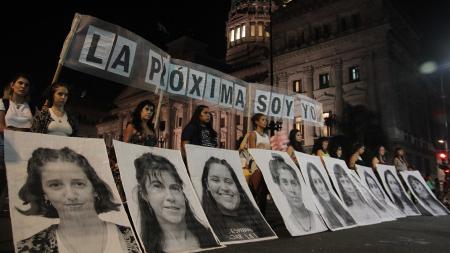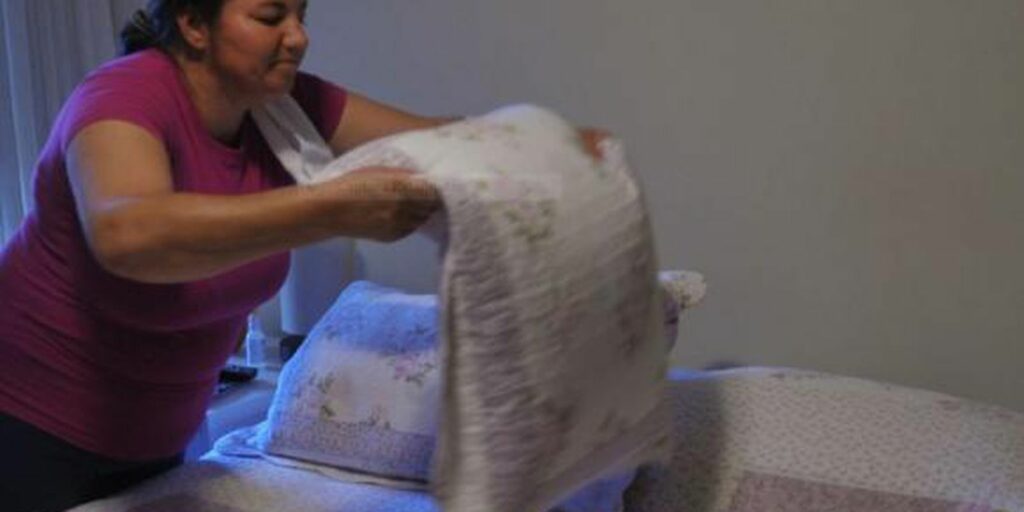Most of the people who participated in a survey released this Saturday by the UN on media coverage of femicides what they remember the most are the details of how the crime was committed, in keeping with the sensationalist tendency of the media, from which they asked for more information on prevention and help, and greater empathy and protection for the victims.
The data comes from the study ‘Femicides in the media and in public opinion’ by the Spotlight Initiative, a United Nations program that received support from the European Union (EU).
The report is novel since it makes a quantitative and qualitative analysis of 1,352 news items on femicide, broadcast between May 2020 and the same month of 2021, in national media -including the Télam news agency-, and in the press from different regions of the country. country, and also incorporates an opinion poll.
An interesting contribution is the high percentage of people (80%) who consider that gender violence is a problem that is naturalized in Argentine society.
That inquiry was made among 597 people from all over the country to measure the degree of knowledge and the impact produced in the audiences by the informative treatment of femicides and other acts of gender-based violence.
When evaluating the contents of the news, the rThe results show that 51% treat femicides as isolated casesand that only half of the notes present data on the context, antecedents or episodes prior to the outcome that delve into the causes of the crime.
Another characteristic is that the sensitivity of the public is appealed to (in 33% of the stories) through details or sensational features with the aim of capturing attention, while little space is dedicated to the possible existence of preventive early warnings.
This data coincides with the claim of those who participated in the opinion survey: 81% requested information on prevention and awareness.

In this regard, only 11% of the news included mention of victim assistance services.
In Argentina, since 2015, Law 27,039 of the Special Fund for the Dissemination of the Fight against Gender Violence has been in force, which obliges the audiovisual media to place the free telephone line 144 with national reach for the attention of those who are in situations of violence.
An interesting contribution is the high percentage of people (80%) who consider that gender violence is a problem that is naturalized in Argentine society.
The modality of the femicides, with the description of the viciousness with which the attack was committed and the state in which the body was found, and the degree of closeness of the femicide with his victim (partner, ex-partner), are the memories that most appear among the people consulted.
“Very few news presents statistical information. They only limit themselves to establishing a ranking of the number of femicides”determined the analysis.

Regarding responsibilities, media criticism focuses on the Judiciary, the police and state agencies.
“In general, the femicide is presented as less responsible than public institutions in the fatal outcome of acts of gender violence,” the report concluded.
When people were asked if they believed the victims’ accounts, 62% said they did and 66% said they did not blame them. It worries the close 40% who do not think the same.
The investigation specifically analyzed 10 femicides that occurred during the year of investigation, such as the transfemicide of Fabiola Pamela Ramírez, that of the Wichí adolescent Nancy Villa, that of the migrant woman Vanesa Carreño, and two that had a high media impact: those of Úrsula Bahillo and Silvia Saravia.
Regarding the use of images, the news analysis showed that the most used are those of marches demanding women’s rights and LGBTIQ+, followed by that of the victims, and, to a lesser extent, of femicides.

The most frequently mentioned sources of consultation are La Casa del Encuentro, the Lucía Pérez Observatory and the Mujeres de la Matria Latinoamericana (MuMalá) collective.
“At the same time, there is a low percentage of references to the statistical work of government agencies,” said the investigation.
One possible explanation is that the official data is provided by the Supreme Court of Justice, and it does so in arrears, a situation that is not consistent with the immediacy required by the times of the media.
On May 31, 2022, the Women’s Office of the Court released the latest update of the National Registry of Femicides of the Argentine Justice 2021.
There, 251 fatal victims of gender violence were reported, with an average of 1 femicide every 35 hours.

In the opinion survey of this research, people were consulted about the gender editors, a new figure in journalism, which Télam incorporated in 2020 and then other media outlets in the country, which are gathered in the Gender Editors Network.
29% of the people surveyed said they were aware of the role of editors and 21% said they knew “a little” about their task.
Those who stated that they were aware of the role of gender editors stated that “it is a valuable role or that it could become so, since they suppose that through their intervention it would be possible to give a more respectful turn to the presentation and treatment of a type of information that, in itself, is violent and painful,” the study analyzed.
The investigation included Télam, Clarín, La Nación, Página/12, Perfil, Infobae, A24.com, TN.com, the nightly editions of Telefé Noticias and Telenoche, the radio programs Cada Mañana (Radio Miter) and El Club del Moro (Radio La 100) and Diario de Río Negro, El Tribuno de Jujuy, El Tribuno de Salta, and República de Corrientes.
The Spotlight Initiative called on the consultancy D’Alessio IROL to carry out the study.


















